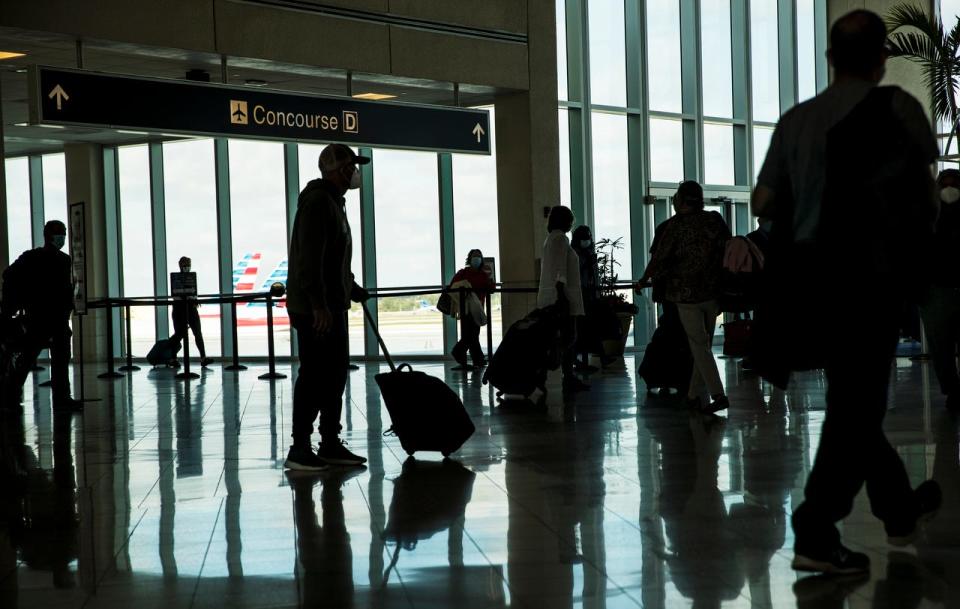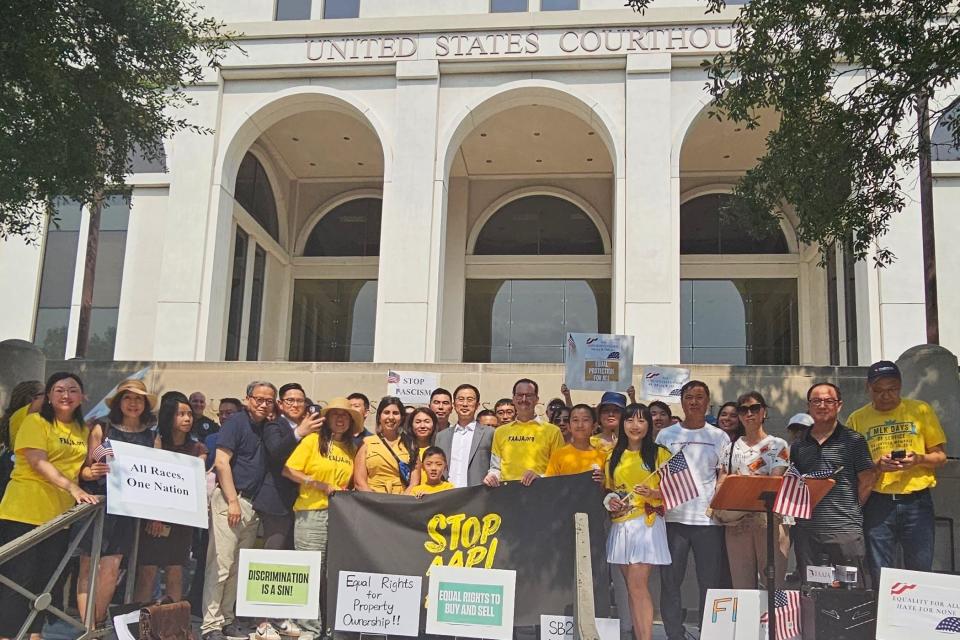New Florida housing law creates fear among Asian Americans, confusion for Realtors
- Oops!Something went wrong.Please try again later.
Asian Americans who live in Florida fear they may become second-class citizens.
Those are the words Frank Zhou, a Naples resident, used to describe how he and fellow members of the Asian American community feel about a new housing law signed by Gov. Ron DeSantis.
A bill referred to as the Interest of Foreign Countries, SB 264, went into effect July 1. This law prohibits the foreign countries of concern – China, Cuba, Iran, North Korea, Russia, Syria and Venezuela – and their officers from buying farmland as well as property within 10 miles of a military installation or critical infrastructure facility.
No one connected with the Chinese government is allowed to purchase real estate anywhere in Florida under the bill, nor can anyone who is "domiciled" in China and not a United States citizen or lawful permanent resident.
In short, that means people from those seven countries of concern may not buy property near the U.S. Coast Guard base in Fort Myers Beach, the airport in Naples and any power or water treatment plants in Collier and Lee counties. And non-permanent Chinese residents in the state can't purchase property at all.
In Lee and Collier counties, there are three airports, two in Fort Myers and one in Naples, four power plants, 450 wastewater treatment plants and 141 water facilities. So temporary Southwest Florida residents from China and six other countries can't own property within a 10-mile radius of any of these places.
This constitutes large swaths of Southwest Florida, according to Florida Department of Environmental Protection facility data. It includes the 10 miles around some public schools, mobile home parks and even gas stations that have wastewater treatment facilities.
Foreign principals who obtained property within the 10-mile radius before July 1 can continue to own it.

The Florida Realtors group advises buyers and sellers to consult with attorneys about how the law may impact their legal rights and responsibilities.
Denny Grimes, a Realtor with 40 years of experience in Southwest Florida, has already begun training via his broker on the new law.
"I believe it's 98% confusion and 2% understanding right now," he said. "That will take time for that to be reversed."
He said real estate contracts have been modified. Above the signature line, a large box reads "attention buyers and sellers," explaining conveyance to foreign buyers and who those buyers are.
"A lot of people out there, they're selling by themselves, by owner; they need to be aware of this," Grimes said.
Throughout his 40 years and 6,000 sales, he doesn't know whether he's ever sold property to someone who would be classified as a "foreign principal" under this law because that's not a question he's had to ask.
Cindy Griesse, a Realtor with Briten Coastal Team, said she plans to take a course about the law in order to do her job properly.
On July 18, a lawsuit challenging the law, Shen v. Simpson, was argued in the U.S. District Court of Northern Florida. The plaintiffs, represented by the ACLU, requested a preliminary injunction to immediately block the law and declare it unconstitutional. U.S. District Judge Allen Winsor said he would make a decision as soon as he can but that a ruling would not be “super imminent.”
SB 264: Chinese Floridians, real estate company sue over DeSantis' foreign land ownership law
Protest in Tallahassee: Florida's Chinese land ownership law debated in court as protesters gather outside
Although the law targets Chinese nationals and other countries, Zhou said it impacts Asian Americans.
He knows of an Asian woman who is a U.S. citizen and works as an office manager at a hospital. She was in contact with a landlord, who requested she provide her passport before continuing with the sale.
The law includes penalties for sellers as well as buyers who violate it: 60 days in prison and a fine of up to $500.
"If I'm a seller and I see a name 'Zhou,' I'm going to say, 'I don't want the headache,'" Zhou said. "So, it puts us in a very awkward or unfair situation."
He pointed out distinguishing nationalities among Asians can be difficult. He is Chinese but fears sellers will be fearful whenever they see an Asian name, even if they are Japanese or Korean and even a citizen of the U.S.
"People who are pro this law say, 'You're a U.S. citizen, you're not impacted.' Yes and no," he said. He provided an analogy of shopping at a grocery store. If the cashier knows they could go to jail for selling products to a Chinese person, they wouldn't want to sell it to them because how could they prove their sale wasn't intentional? Or maybe that cashier could ask them to go home and grab their passport to prove they're a citizen. But they'd sell to a white or Black person with no issues.
"Suddenly, I become a second-class citizen," he said.
The law was created on the basis of protecting national security. Senate President Kathleen Passidomo, who represents Collier and parts of Lee counties, voted in favor of the law.
"This measure is necessary to ensure Florida is safe from foreign threats who look to weaken our security and jeopardize our nation’s food supply," said Katherine Betta, the Senate President's chief of staff of communications.
Military installations are broadly defined as "a base, camp, host, station, yard or center, encompassing at least 10 contiguous acres under the jurisdiction of the Department of Defense or its affiliates," according to the statute. Critical infrastructure includes power plants, water treatment facilities, telecommunications central switching offices like a big AT&T or Verizon building, gas processing plants, seaports, spaceports, airports and more.
Nicholas Warren, a staff attorney for the ACLU in Florida, represents clients affected by this law in the case challenging its legality heard July 18. One of his clients is an asylum seeker from China, and two others are Chinese students on H1 visas. He described the law, which has two sets of restrictions, as overbroad and unconstitutional.

“The first set of land ownership restrictions bars people from seven specific countries from owning property within a certain radius of places that are large categories that are broadly connected to the military or infrastructure like electricity, which is a huge swath of the state," he said. "The second set of land ownership restrictions specifically bars people from China from owning or acquiring any property anywhere in Florida.”
There are exceptions to these restrictions. People who are domiciled in one of the seven countries who have a non-tourist visa or who have been granted asylum can buy one home, but only if it's outside of the 10-mile radius and is less than 2 acres.
"But there's no protection for someone who has applied for asylum but is waiting for their application, or someone who has a different type of visa like our clients, one of them is on a student visa, two of them are on H1 visas, which are temporary visas," Warren said. "So, that exemption doesn't apply."
Those concerned about the bill include the grassroots organization Florida Asian American Justice Association. What concerns members of the association and others who protested July 18 in Tallahassee are the discriminatory effects for Asian Americans who aren't "foreign principals."
"We are absolutely pro-American because we are Americans," Zhou said. "But also, being American, you've got to be treated fundamentally fair. We have our rights as well."
Emma Behrmann is a breaking news reporter for The Naples Daily News and News-Press. You may reach her at EBehrmann@gannett.com. Follow her on Twitter @emmabehrmann.
This article originally appeared on Naples Daily News: Florida housing law SB 264 bars some foreigners from owning land

